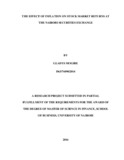| dc.contributor.author | Mogire, Gladys | |
| dc.date.accessioned | 2017-01-20T09:43:07Z | |
| dc.date.available | 2017-01-20T09:43:07Z | |
| dc.date.issued | 2016 | |
| dc.identifier.uri | http://hdl.handle.net/11295/100428 | |
| dc.description.abstract | Inflation has probably been a characteristic of human history since money was adopted as a means of payment. The relationship between stock market performance and inflation is imperative for investors because stocks are expected to provide protection from the effects of inflation. However, various theoretical foundations provide mixed findings on the connection between inflation and stock market returns. This study therefore sought to determine the effect of inflation on stock market returns at the Nairobi securities exchange. The independent variable for this study was inflation measured using the consumer price index while the dependent variable was stock market returns measured using share index. Interest rates, money supply and exchange rates formed the control variables. The study employed a descriptive research design and carried out a census of the 65 firms listed at the Nairobi Securities Exchange, as at December 2015. The study used secondary data, which was analyzed using the augmented dickey fuller model, the granger causality test and finally the regression analysis. The results of the Augmented Dickey Fuller test (ADF) found that the time series had a unit root. The granger causality test found that there was a causal relationship between inflation and stock market returns but there was no causal relationship between stock market returns and inflation. The regression results found a significant positive relationship between inflation and stock market returns and a significant negative relationship between interest rates and stock market returns at the Nairobi Securities Exchange. The findings also found an insignificant negative relationship between money supply and exchange rates at the Nairobi Securities Exchange. The study concluded that inflation positively affects stock market returns while interest rates, money supply and exchanges rates negatively stock market returns at the Nairobi Securities Exchange. The study recommended the government of Kenya should formulate policies on inflation, interest rates, money supply and exchange rates to ensure that they do not have adverse effects on stock market returns. | en_US |
| dc.language.iso | en | en_US |
| dc.publisher | University of Nairobi | en_US |
| dc.rights | Attribution-NonCommercial-NoDerivs 3.0 United States | * |
| dc.rights.uri | http://creativecommons.org/licenses/by-nc-nd/3.0/us/ | * |
| dc.subject | The Effect of Inflation on Stock Market Returns at the Nairobi Securities Exchange | en_US |
| dc.title | The Effect of Inflation on Stock Market Returns at the Nairobi Securities Exchange | en_US |
| dc.type | Thesis | en_US |



